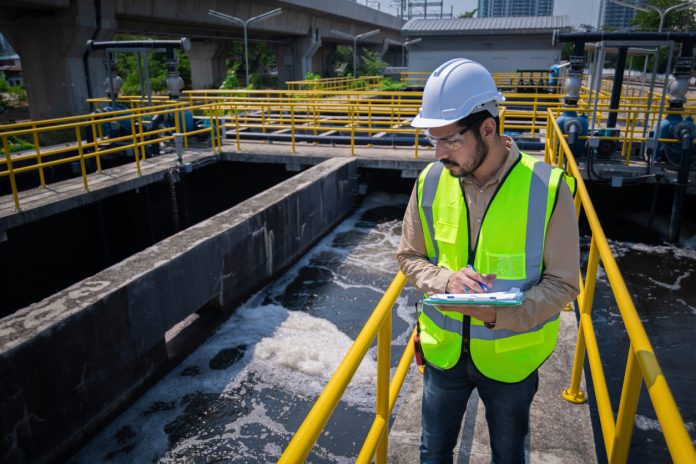Wastewater management is a critical issue for our communities and the environment. Understanding its complexities is crucial. Modern wastewater challenges are not just about treating and disposing of waste; they’re about protecting your water resources and ensuring public health. Technological advancements and increased urbanization have led to more complex waste compositions, necessitating sophisticated treatment methods. Climate change also plays a role, with extreme weather events affecting wastewater systems. Addressing these challenges is vital for maintaining the health of both communities and the environment.
Utilizing Technological Advances
Your awareness of the latest technological advances in wastewater treatment can greatly impact how you perceive this environmental issue. Recent years have seen significant strides in technology, aiming to make wastewater treatment more effective and sustainable. Advanced filtration systems now allow for the removal of finer contaminants, ensuring cleaner water returns to your environment. New biological treatment processes have emerged, harnessing natural processes to break down waste more efficiently and with less environmental impact.
These technologies not only improve water quality but also reduce the energy footprint of wastewater treatment plants. Innovative monitoring tools and data analytics play a role, too. They enable more precise control of treatment processes, ensuring optimal performance and helping to identify issues before they become major problems. This evolution in technology not only addresses current environmental challenges but also sets a foundation for future advancements in maintaining your water’s health and safety.
Choosing Sustainable Practices
Your role in sustainable wastewater management is more critical than ever in today’s environmental context. Sustainable practices in this field are not just beneficial; they are necessary for preserving your water resources for future generations. Key practices include reducing water consumption, thereby decreasing the volume of wastewater produced. This can be achieved through efficient water use in your daily activities. Recycling and reusing wastewater is another sustainable approach, turning what was once waste into a valuable resource.
Green infrastructure, such as constructed wetlands and bio-swales, uses natural processes for wastewater treatment and offers added benefits like habitat creation. Minimizing the use of harmful chemicals in your homes and industries also plays a significant role in reducing the pollutant load in wastewater. These practices contribute to environmental conservation and promote a healthier ecosystem, directly impacting your well-being and that of your community. Adopting these sustainable methods in wastewater management reflects a commitment to a cleaner, more sustainable future.
Finding Cost-Effectiveness and Achieving Efficiency
Whether you manage a town or operate a machine plant, your understanding of cost-effectiveness and efficiency in wastewater treatment is pivotal for both environmental and economic sustainability. Efficient wastewater management systems are not only environmentally responsible but also economically sensible.
Adopting efficient treatment methods can significantly reduce operational costs while ensuring compliance with environmental regulations. Innovations in treatment processes, like these ARO water and wastewater pumps, have led to reduced energy consumption, which is a major cost factor in wastewater management for both municipalities and industry. The recycling and reuse of treated water can also provide cost savings, especially in water-scarce regions. Effective sludge management, a by-product of wastewater treatment, can also lead to cost reductions, either through energy generation or its use in agriculture.
Automation’s Role in Wastewater Solutions
Automation in wastewater treatment represents a significant shift towards more efficient, reliable, and cost-effective processes that can scale up with demand. Automated systems provide real-time monitoring and control, ensuring optimal operation of treatment facilities. This leads to consistent quality in treated water, minimizing risks to your health and the environment. Automation also reduces the need for manual intervention, cutting down on labor costs and human error.
With the integration of smart technologies, predictive maintenance becomes possible, preempting equipment failures and downtime. Your appreciation of these advancements shows a recognition of how technology can be harnessed to sustainably manage one of your most precious resources: water. Automation streamlines wastewater treatment processes and contributes to a more sustainable and resilient future for your communities.
The Future of Wastewater Management
The field is evolving towards more sustainable and technologically advanced systems. In the future, expect to see increased use of renewable energy sources in wastewater treatment, reducing the carbon footprint and operational costs. Smart water management systems, utilizing IoT and AI, will become more prevalent, offering greater efficiency and predictive maintenance capabilities.
There will be a growing emphasis on water reuse and recycling, driven by water scarcity and environmental concerns. Innovations in biotechnology may also introduce more natural and cost-effective waste treatment solutions. Your understanding of these trends is essential for preparing for a future where water management is necessary and a responsibility towards your environment and community.
From embracing new technologies and sustainable practices to acknowledging future trends and economic implications, your role in this journey is indispensable. Your awareness and actions will contribute significantly to environmental sustainability and the well-being of your community. This evolving field promises a future where water management is not just a technical challenge, but a shared responsibility and opportunity for innovation and environmental stewardship.




































